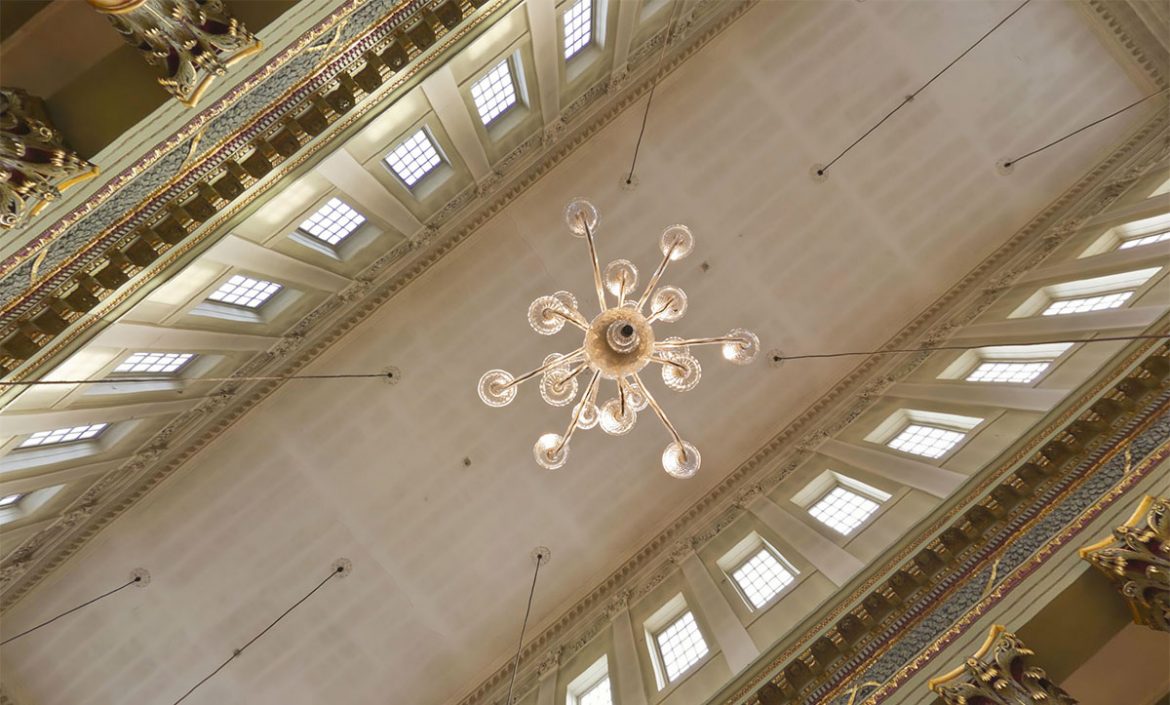One of York’s most impressive Georgian buildings is to close for months – after serious problems were detected in the ceiling.
York Assembly Rooms, home to a branch of the Ask Italian Restaurant chain, will shut in early July and may not reopen for another three to four months.
It follows the discovery that parts of the ceiling were in danger of falling down.
Worrying discovery
The Assembly Rooms on Blake Street date back to 1730 and is now owned by the York Conservation Trust.
The problems were discovered about a month ago, during repair work to the capitals on top of the columns. A workman spotted some unusual shadowing on the ceiling, and further investigation found that parts of the plaster were starting to come away.

That posed a risk of chunks of the ceiling falling onto the staff and diners 26ft below.
To prevent this happening, plywood boards have been placed across the whole of the ceiling. “We didn’t want what happened to the theatre in London, where the ceiling physically came down,” said trust property manager Ian Daniells.
He said the structure of the building was sound, it was just the plasterwork that was coming loose. The state of the ceiling beneath the plywood was being monitored with twice-weekly X-rays.
Major project

Fixing the problem will not be easy. Specialist firm Ornate Plasterers from Leeds are to undertake the work.
The first job is to put up scaffolding the length of the Assembly Rooms, and onto the roof.
Then workers will have to remove the old Victorian air ducting system, which is adding an extra one tonne of weight to the ceiling. Ian said they have already removed a tonne of rubbish from the ceiling void.
Next, the old ceiling plasterwork will be removed completely and discarded. They will be careful to try to retain the original coving.
History of the Assembly Rooms

It was paid for by public subscription and designed by Richard Boyle, 3rd Earl of Burlington. The building was begun in 1730, first used in August 1732, but not entirely completed until 1735.
Probably the earliest neo-classical building in Europe, The Assembly Rooms proved to be one of the most influential pieces of architecture of the early 18th century.
In 1925 the building was purchased by York Corporation, who began repairs when they took full control in 1939, and more fully restored it in 1951.
York Conservation Trust bought the Assembly Rooms in November 2002. Currently used as an Ask Italian restaurant, it is still open for public viewing and is also available for City of York Council functions on five days a year.
Traditional methods

The original ceiling was constructed using the lath and plaster method. Wooden laths would be nailed to the joists then they would push lime mortar in between.
It will be fixed in the same way. New chestnut laths will be screwed into the joists – a labour-intensive task in itself.
Then the lime mortar will be added. It takes quite a while to dry before it can be painted – and as many as five coats of paint will be needed.
Chandeliers go to Norfolk
“We can’t put modern materials in there,” said Ian. “We as a conservation trust have just started using lime products again.
“The Romans used it for years. We have returned to it – it’s a better product than what’s on the market now.
“You put plasterboard and skim on top it becomes a very hard surface. Lime will harden up, but it will also breathe.”
The stunning chandeliers will also have to be taken down. They will then be sent to a specialist firm in Norfolk to be cleaned and refurbished before being reinstated.
So, how much will this all cost? Ian’s best estimate at the moment is the work will cost around £250,000.
Lord Mayor lunch row

In recent years The Assembly Rooms have hosted the lunch to celebrate the incoming Lord Mayor of York.
When the ceiling problems became evident, City of York Council was alerted.
Ian said he wanted to give the Civic Party the chance to explore other options. “The last thing we wanted was the Lord Mayor to be getting her regalia on and the ceiling fall down.”
In the event, thanks to the boarded-up ceiling, the Assembly Rooms could have hosted the lunch – to celebrate the inauguration of Cllr Barbara Boyce as the new Lord Mayor on May 25.
But the council took the decision to relocate the lunch at the Star Inn The City.
‘Wrong signals’

He said: “The whole point with this is that the choice of a top notch prestigious city centre restaurant for an event that has absolutely no benefit to the tax paying residents of this city is wholly inappropriate and sends out all the wrong signals from the council in times of cutbacks to services and continuing job losses.”
Dawn Steel, head of civic & democratic services at the council, responded to Cllr Warters by saying: “Officers are always cost conscious and appropriately restrained by the available budget to support this occasion.
“I can assure you costs for the current venue are well within budget and are being managed very carefully so as to not to place any additional pressure on the budget already allocated.”
